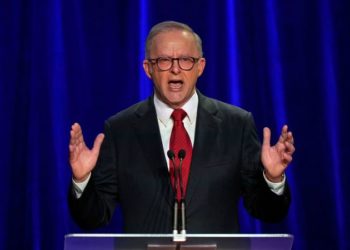Several federal prosecutors — including the chief of the Public Corruption and Civil Rights Section — have submitted their resignations following a plea deal offered by the new U.S. attorney in Los Angeles to a sheriff’s deputy who had already been found guilty of using excessive force.
Two sources confirmed to The Times that Assistant U.S. Attorneys Eli A. Alcaraz, Brian R. Faerstein and section chief Cassie Palmer resigned from the office over a “post-trial” plea agreement filed Thursday in the case of Trevor Kirk, an L.A. County sheriff’s deputy who was convicted of a felony for assaulting and pepper-spraying a woman outside Lancaster supermarket.
Reached Saturday afternoon, Faerstein said he had no comment. None of the other prosecutors said to have resigned responded to inquiries. The sources who confirmed the resignations requested anonymity because they feared retaliation. A spokesperson for the U.S. attorney’s office declined to comment.
Kirk, who has been “relieved of duty” by the Sheriff’s Department, was found guilty in February of one felony count of deprivation of rights under color of law and faced up to 10 years in prison. Under the plea deal filed Thursday, which still requires approval from a judge, he would serve a maximum of one year in prison. The government agreed to recommend a year of probation.
In June 2023, Kirk was responding to a reported robbery when he threw a woman to the ground and pepper sprayed her in the face while she filmed him outside a Lancaster WinCo. While the woman matched the description of a female suspect Kirk had received from a dispatcher, she was not armed or committing a crime at the time he first confronted her, court records show.
Under the new agreement, Kirk would plead guilty to a lesser-included misdemeanor violation of deprivation of rights under color of law.
If the plea is approved by the judge, according to the agreement, the U.S. attorney’s office would “move to strike” the jury’s finding that Kirk injured the victim.
Alcaraz, Palmer, Faerstein and another prosecutor, Michael J. Morse, all withdrew from the case on Friday, according to court filings. The only assistant U.S. attorney who signed off on the plea agreement, Robert J. Keenan, was not previously involved in the case.
Bill Essayli, appointed U.S. attorney for Los Angeles last month by President Trump, is also listed on the agreement.
Kirk’s attorney, Tom Yu, declined to comment Friday evening. Previously, he described Kirk as a “hero, not a criminal” and said video showed he acted within the law to “detain a combative robbery suspect.”
Essayli’s move to offer a misdemeanor plea to a defendant who had already been convicted was extremely unorthodox, according to Carley Palmer, a former supervisor in the federal prosecutor’s office in Los Angeles who is now a partner at Halpern May Ybarra Gelberg LLP.
“It’s not unprecedented, but it is extraordinary, to try to have a jury verdict withdrawn and replaced by a plea agreement to a lesser crime. The government invests extraordinary resources to take a case like that to trial,” she said. “You have the agency’s investigation, you have all the man or woman hours … then you have a jury that says you got it right beyond a reasonable doubt.”
To justify seeking a post-conviction plea deal, prosecutors would need to have found evidence that the defendant was innocent or that there was some serious misconduct on the part of the trial team, according to Palmer.
Last month, U.S. District Judge Stephen V. Wilson denied a motion from Yu for an acquittal. Wilson ruled footage of the incident was sufficient evidence for a jury to find Kirk had used “objectively unreasonable force.”
“J.H. did not have a weapon, did not attack Defendant, was not attempting to flee, and was not actively committing a crime,” Wilson wrote, identifying the woman involved by initials.
The judge also noted in his ruling that while Kirk acted aggressively toward the woman from the outset, his partner managed to lead the arrest of the other robbery suspect without using force.
There are noticeable differences in the way the new plea agreement describes what Kirk did, as compared to a press release issued by the U.S. attorney’s office in February when the jury returned a guilty verdict.
The agreement makes references to the woman having “resisted” Kirk’s attempt to detain her and describes her as “swatting” at the deputy’s arm.
In his ruling last month, Wilson determined this could have been seen as the victim reacting reflexively to Kirk’s actions, and noted it’s unclear if she even hits Kirk.
The plea agreement also makes no reference to the woman’s injuries, while the February release says she “was treated for blunt-force head trauma and injuries to her head, arms, and wrist.”
Attorney Caree Harper, who is representing the woman in a civil suit that reached a settlement earlier this year, said the new plea deal is “changing the facts” and is not supported by video footage of the incident.
“They’re taking creative liberty with the facts and deciding to give a jury of Trevor Kirk’s peers the middle finger and it should not be tolerated,” she told The Times. If Wilson approves the agreement, Harper said, she expects civil rights groups will launch protests and urge state or county prosecutors to take up the case.
Harper noted that downgrading Kirk’s charge from a felony could allow him to continue working as a law enforcement officer. He will also retain his right to own a firearm without a felony conviction.
“He definitely should not be able to wear a badge again, anywhere in any state,” she said.
According to Robert Bonner, a former federal judge who now chairs the county’s Civilian Oversight Commission, a post-conviction plea deal is an extreme rarity. Allowing pleas after trial, Bonner said, could undermine prosecutors’ ability to negotiate in the future.
“If you did this routinely, you could never get a plea bargain,” he said.
Even though federal prosecutors and the defense have both agreed to the deal, Bonner said, the judge doesn’t have to adhere to it.
“He could reject the whole plea deal, or he can accept the plea deal and say I’m not going to give one year probation, I’m going to give six months in custody or some other period of time up to one year in prison,” he said.
Wilson last month refused to delay Kirk’s May 19 sentencing hearing, after prosecutors told him Essayli wanted more time to review the case.
Support for Kirk began gaining steam on social media after his indictment last September. In January, Nick Wilson, founder of a first responder advocacy group and spokesperson for the Los Angeles Sheriff’s Professional Association, wrote a letter to Trump urging him to intervene before the case went to trial. Former Sheriff Alex Villanueva, who has become increasingly popular in right-wing circles online, has also championed Kirk’s case, posting Instagram video of himself and Wilson consoling the deputy at the courthouse after trial.
Wilson, the Sheriff’s Professional Association spokesperson, on Friday said he was “encouraged by the recent development in Deputy Trevor Kirk’s case and will continue to monitor the upcoming sentencing closely.”
“While this case should never have been prosecuted in the first place, we are deeply grateful the Department of Justice took a second, impartial look at the facts and merits,” he said in an email. “This action sends a powerful message — not just in Trevor’s case, but to law enforcement officers across the state and nation who too often feel abandoned or politically targeted in today’s climate.”
A spokesperson for the L.A. County Sheriff’s Department did not immediately comment on the developments in Kirk’s case.
The wave of resignations comes amid other recent controversy in the federal prosecutor’s office. In March, a White House official fired Adam Schleifer as an assistant U.S. attorney, in a one-line email informing him that the dismissal was “on behalf of President Donald J. Trump.”
Schleifer recently challenged his firing, calling it “unlawful” and alleging it was motivated in part by his prosecution of Andrew Wiederhorn, the former chairman and chief executive of Fat Brands, which owns the Fatburger and Johnny Rockets restaurant chains. Schleifer had also posted negative comments about Trump during a period when he left his job as prosecutor to run for office as a Democrat.
According to Meghann Cuniff, an independent legal affairs reporter, the Department of Justice is reviewing a separate case involving Alexander Smirnov, a former FBI informant who pleaded guilty to lying about a phony bribery scheme involving President Biden and his son Hunter. A federal judge sentenced Smirnov to six years in prison.
The turmoil in the L.A. federal prosecutor’s office follows mass resignations in the U.S. attorney’s office in Manhattan earlier this year, when several prosecutors stepped down after Trump administration appointees pushed to drop corruption charges against New York City Mayor Eric Adams.
The post L.A. federal prosecutors resign over plea deal for convicted sheriff’s deputy, sources say appeared first on Los Angeles Times.




